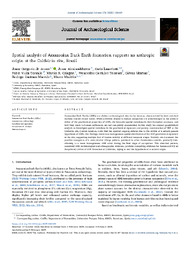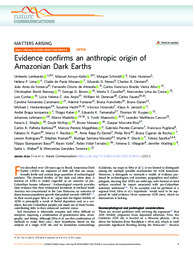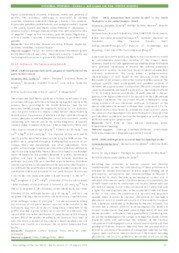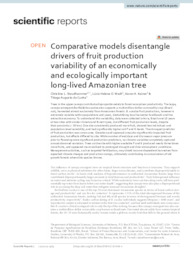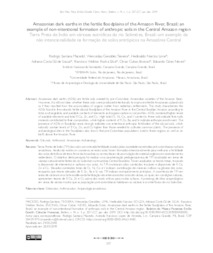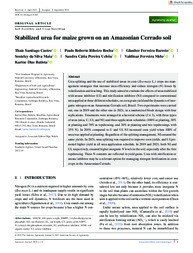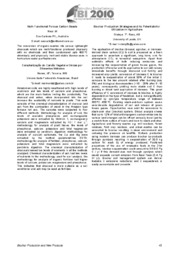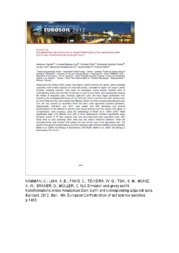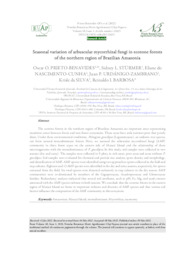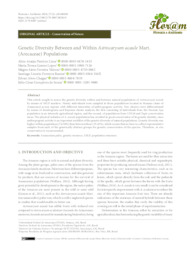Search Publications
Filter by:
| Author(s): SOUZA, J. G. de; ALCAINA-MATEOS, J.; LANCELOTTI, C.; VIDAL-TORRADO, P.; CALEGARI, M. R.; TEIXEIRA, W. G.; MARTINS, G. C.; MACEDO, R. S.; MADELLA, M. Amazonian Dark Earths (ADEs) are distinct archaeological sites in the Amazon, characterized by their enriched nutrient content in soil layers. While activities related to human occupation are acknowle... ... |
| Author(s): LOMBARDO, U.; ARROYO-KALIN, M.; SCHMIDT, M.; HUISMAN, H.; LIMA, H. P.; MORAES, M. de P.; NEVES, E. G.; CLEMENT, C. R.; FONSECA, J. A. da; ALMEIDA, F. O. de; ALHO, C. F. B. V.; RAMSEY, C. B.; BROWN, G. G.; CAVALLINI, M. S.; COSTA, M. L. da; CUNHA, L.; ANJOS, L. H. C. dos; DENEVAN, W. M.; FAUSTO, C.; CAROMANO, C. F.; FONTANA, A.; FRANCHETTO, B.; GLASER, B.; HECKENBERGER, M. J.; HECHT, S.; HONORATO, V.; JAROSCH, K. A.; JUNQUEIRA, A. B.; KATER, T.; TAMANAHA, E. K.; KUYPER, T. W.; LEHMANN, J.; MADELLA, M.; MAEZUMI, S. Y.; CASCON, L. M.; MAYLE, F. E.; MCKEY, D.; MORAES, B.; MORCOTE-RÍOS, G.; BARBOSA, C. A. P.; MAGALHÃES, M. P.; PRESTES-CARNEIRO, G.; PUGLIESE, F.; PUPIM, F. N.; RACZKA, M. F.; PY-DANIEL, A. R.; ROCHA, B. C. da; RODRIGUES, L.; ROSTAIN, S.; MACEDO, R. S.; SHOCK, M. P.; SPRAFKE, T.; BASSI, F. S.; VALLE, R.; VIDAL-TORRADO, P.; VILLAGRÁN, X. S.; WATLING, J.; WEBER, S. L.; TEIXEIRA, W. G.
|
| Author(s): TEIXEIRA, W. G.; MACEDO, R. S.; NEVES, E. G. This study brings a pedogeochemical characterization of ADE found in the naturally fertile alluvial floodplains of the Amazon river in the Central Brazilian Amazon. |
| Author(s): STAUDHAMMER, C. L.; WADT, L. H. de O.; KAINER, K. A.; CUNHA, T. A. da Trees in the upper canopy contribute disproportionately to forest ecosystem productivity. The large, canopy-emergent Bertholletia excelsa also supports a multimillion-dollar commodity crop (Brazil nut... ... |
| Author(s): MACEDO, R. S.; TEIXEIRA, W. G.; LIMA, H. N.; SOUZA, A. C. G. de; SIVA, F. W. R.; ENCINAS, O. C.; NEVES, E. G. Amazonian dark earths (ADEs) are fertile soils created by pre-Columbian Amerindian societies of the Amazon Basin. However, it is still not clear whether these soils were produced intentionally to impr... ... |
| Author(s): CASTRO, T. S.; ROCHA, P. R. R.; BARRETO, G. F.; MAIA, S. da S.; UCHÔA, S. C. P.; MELO, V. F.; BATISTA, K. D.
|
| |
| Author(s): KAMMANN, C.; LIMA, A. B.; FINKE, C.; TEIXEIRA, W. G.; TSAI, S. M.; MUNIZ, A. W.; BRAKER, G.; MULLER, C.
|
| Author(s): PRIETO-BENAVIDES, O. O.; STURMER, S. L.; FARIAS, E. do N. C.; URDANIGO-ZAMBRANO, J. P.; SILVA, K. da; BARBOSA, R. I. The ecotone forests in the northern region of Brazilian Amazonia are important areas representing transition zones between forest and non-forest ecosystems. These areas have soils nutrient-poor that p... ... |
| Author(s): LIMA, A. A. P.; LOPES, M. T. G.; VALENTE, M. S. F.; FERREYRA RAMOS, S. L.; CHAGAS, E. A.; SOUZA, J. C. G. de This study sought to evaluate the genetic diversity among and within natural populations of the species by means of the AFLP molecular marker, since knowledge of the genetic variability of A. acaule p... ... |
Observation
Some of Embrapa's publications are published as ePub files. To read them, use or download one of the following free software options to your computer or mobile device. Android: Google Play Books; IOS: iBooks; Windows and Linux: Calibre.
Access other publications
Access the Agricultural Research Database (BDPA) to consult Embrapa's full library collection and records.
Visit Embrapa Bookstore to purchase books and other publications sold by Embrapa.

